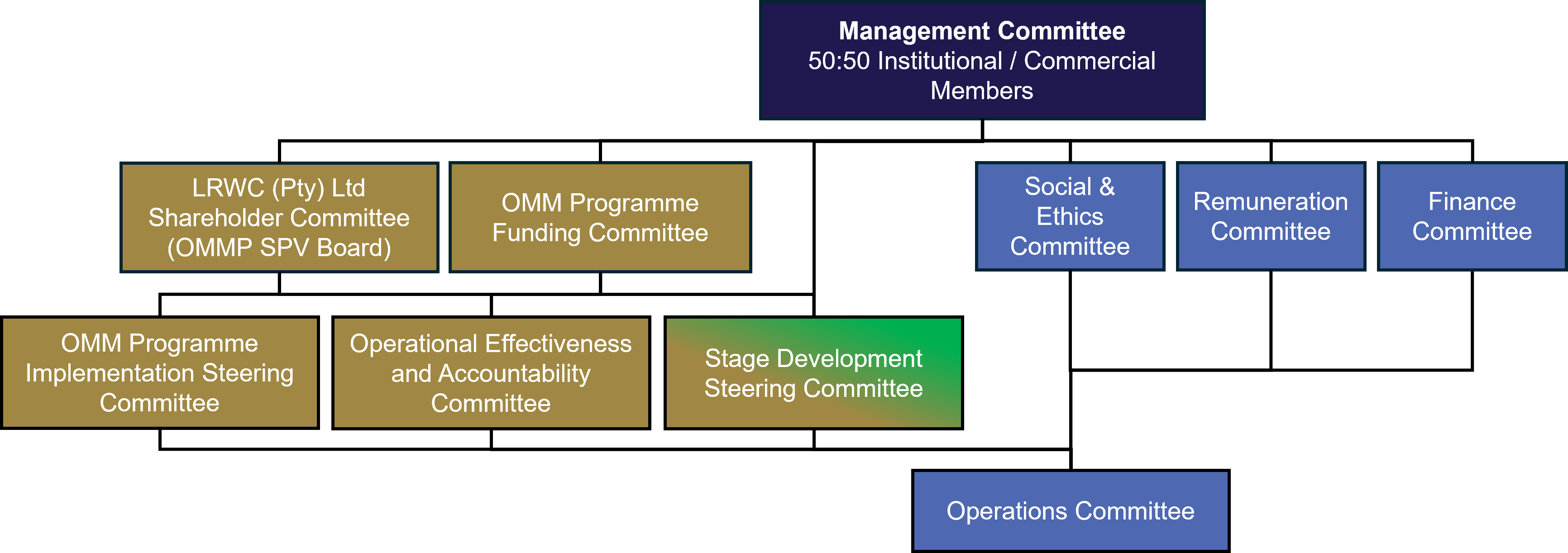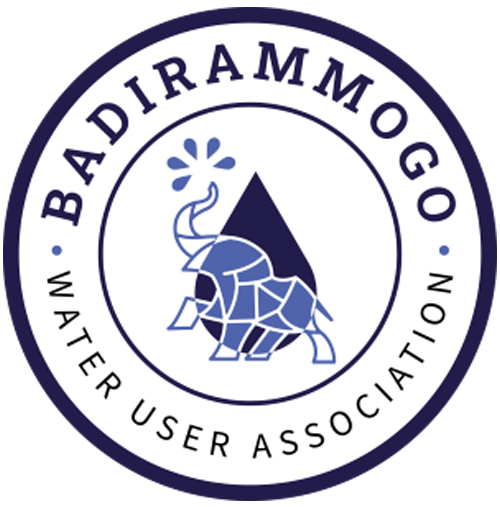Building infrastructure to improve lives and strengthen the economy
The OMMP is accelerating the development of bulk raw and potable water infrastructure in Limpopo through a 50:50 public-private collaboration between Commercial Members (mining, industrial users) and Institutional Members (Government, represented by the Department of Water and Sanitation [DWS]).
The OMMP’s infrastructure will supply targeted communities and commercial water users in Sekhukhune District Municipality and Mogalakwena Local Municipality, while optimising the utilisation of existing infrastructure and water supply from two dams (the De Hoop and Flag Boshielo Dams) in the Middle Olifants catchment. The OMMP will also enhance the water supply to the Polokwane Local Municipality, which faces a 30 Ml/day water shortage.


The OMMP represents a synergistic, long-term social compact between Government and business
The hive understands the need for synergistic co-existence

Shared responsibility for improved accountability
Decision-making responsibilities between Institutional and Commercial Members are shared equally through the Association’s collaborative structures that have been put into place to protect all stakeholders’ interests and enhance accountability. The structure is underpinned by a Charter in accordance with the principles of KingIV™ good governance.
Our governance and operating model structure

How is the OMMP being implemented?
The OMMP is re-sequencing the construction of the remainder of the ORWRDP and expanding it to include potable water provision to meet revised water needs in the Middle Olifants Catchment Area and reduce capital infrastructure costs.
Resourcing partnerships are being established to not only construct defined bulk raw water and potable water infrastructure, but to also ensure that the entire network is operated and maintained efficiently and effectively.

Key objectives
Water Security
Achieve water security through the accelerated delivery of the ORWRDP and the supply of potable and bulk raw water infrastructure to identified areas. Improve water service delivery by supporting Water Service Authorities.
Economic Growth
Job Creation and Skills Development
Cost Savings and Operational Efficiency
Save costs by optimising available technical designs. Achieve operational efficiency by utilising existing dams and water infrastructure to their optimal efficiency levels and leveraging private sector contributions.
Shared CAPEX and cost-effective tariff
Socio-Economic Development
Accelerate socio-economic development (SED) in Limpopo Province through localisation of infrastructure and operational spend and the implementation of the OMMP’s SED initiatives. Collaborate to further develop high impact socio-economic projects.
Sustainability
Comply with sustainability principles of the economy, society and the environment through the Association’s mandate to implement the OMMP as well as manage and operate specified infrastructure. Contribute to changing behaviour related to water conservation and payment for services.
Model Pilot Programme
Social Harmony
While the OMMP commenced when the Association signed the Heads of Terms for an OMM Framework Agreement with DWS in March 2022, it was officially launched by the former Minister of Water and Sanitation, Mr. Senzo Mchunu, on the 27 October 2022 at the Ga-Malekana Tribal Authority in Steelpoort, Limpopo. This was followed by the turning of the first sod at the Spitskop Pump Station in Steelpoort, which signalled the start of the construction of the OMMP.
Further engagements with the Minister culminated in an invitation to the Presidential Imbizo in Sekhukhune in which Government’s funding commitment to the OMMP was confirmed. Subsequent to this, it can be confirmed that the first payment of OMMP Stage 1 funding from Government has been received, together with confirmation of approval for the Stage 2 funding allocation. The Association continues to engage fruitfully with DWS.
Construction on Southern Extension 2 (SE2) Phase 1 commenced in October 2022 and reached practical completion in March 2024. SE2 Phase 1 was commissioned by the then Minister of Water and Sanitation, Mr Senzo Mchunu, on 26 April 2024 at a ceremony at the new Spitskop Pump Station 2.
The OMMP’s technical study phase was concluded in October 2024 and approved at the Association’s Annual General Meeting in November 2024. This was followed by the publishing of the Full Business Case in November 2024.
The OMMP’s financial close and the commencement of the construction of Stage 1 (Phase 2B & 2B+) is expected in the third quarter of 2025.
Further updates on the OMMP are available in our Monthly Progress Bulletins, accessible on our News and Media page

The OMMP aims to leverage infrastructure development to strengthen economic recovery across Limpopo
The OMMP will unlock the strategic mineral and industrial potential in the specified regions and bring with it much-needed potable water, water security, significant job creation and socio-economic development.
Key numbers and projected impact
~200km of bulk raw water pipeline will be built. |
~675km of bulk potable water pipeline will be built. |
~140 communities will benefit from potable water to a yard connection (i.e. at the boundary of each stand), impacting about 390 000 people |
~42 000 people will be impacted through direct, indirect and induced employment for the duration of the OMMP |
SED is at the very heart of the OMMP
Infrastructure programmes such as the OMMP cannot be completed without considering the socio-economic development (SED) impact on communities and the need for secondary economies to be established. That is why we are taking a holistic approach to SED and our programmes will focus on five key themes: Potable Water, Water Re-Use, Enterprise Development, Education and Connectivity, to develop skills, create jobs and change behaviour.

Shaping the future of our youth through our School Upgrade Programme
The School Upgrade Programme (SUP) is one of the OMMP’s key SED initiatives and is significant because it focuses on all five of the abovementioned SED themes at the same time. The SUP aims to equip selected primary and secondary schools in targeted communities in Limpopo with innovative, modular infrastructure according to each school’s needs. The SUP focuses on supporting selected schools with facilities and equipment, as well as equipping teachers and addressing indirect issues to allow pupils better opportunities to learn.
In parallel with the start of the OMMP’s construction phase, the SUP kicked off with a pilot project at Kwata Primary School in Ga-Phala, which was launched by the Deputy Minister of Water and Sanitation, Mr David Mahlobo, on 15 March 2023.
To date, a further 4 schools have been upgraded across the Sekhukhune District and Mogalakwena Local Municipalities.
For the latest updates on our SED initiatives, please visit our LinkedIn page or our latest newsletter, available in our news and media section



We aim to be a strategic role model for future water delivery
In addition to the implementation of the OMMP, the Association is looking at more opportunities to collaborate with the highest levels of Government, the private sector and communities. We aim to demonstrate leadership in the water sector and, through the OMMP, be a strategic role model for future water delivery that may be replicated across South Africa so that more people may receive the benefits of a consistent supply of water.

Get regular
progress updates
For the latest news on the Olifants Management Model (OMMP), please see our latest Monthly Progress Bulletin or Newsletter in our News & Media webpage
